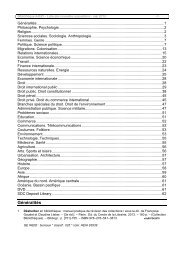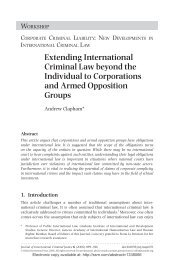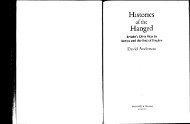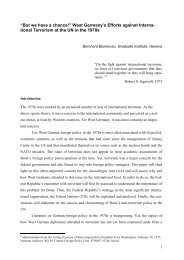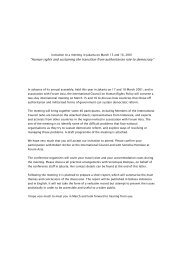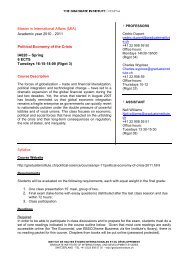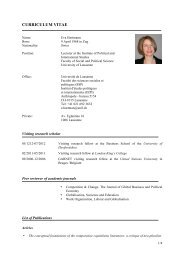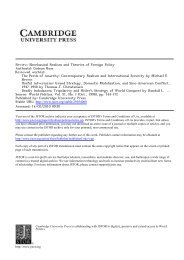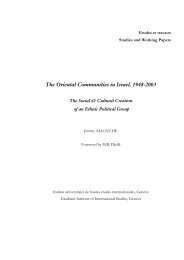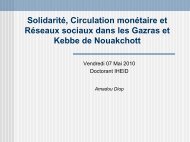The 1953 Coup D'etat in Iran Author(s): Mark J. Gasiorowski Source ...
The 1953 Coup D'etat in Iran Author(s): Mark J. Gasiorowski Source ...
The 1953 Coup D'etat in Iran Author(s): Mark J. Gasiorowski Source ...
You also want an ePaper? Increase the reach of your titles
YUMPU automatically turns print PDFs into web optimized ePapers that Google loves.
278 <strong>Mark</strong> J. <strong>Gasiorowski</strong><br />
was still illegal and thus forced to operate clandest<strong>in</strong>ely. Most <strong>Iran</strong>ians were very<br />
wary of the Tudeh. Mosaddeq had taken strong measures aga<strong>in</strong>st the Tudeh as<br />
late as August 18, <strong>1953</strong>, and presumably would have blocked any direct threat by<br />
the Tudeh as he had those of Qavam, Zahedi, and Kashani. Moreover, it can be<br />
assumed that the United States and Brita<strong>in</strong> would have used force to prevent any<br />
serious attempt by the Tudeh to seize power.<br />
Not only was a coup unlikely without U.S. help, but Mosaddeq's position at<br />
this time was not as precarious as is commonly believed. Although the <strong>Iran</strong>ian<br />
economic situation had been described by U.S. analysts as "desperate" <strong>in</strong> late<br />
1951, stimulative fiscal policies begun <strong>in</strong> the summer of 1952 had produced a<br />
modest recovery by the end of the year. Efforts were made to sell oil to countries<br />
such as Japan and Italy <strong>in</strong> early <strong>1953</strong>. Bus<strong>in</strong>ess was described as "brisk" <strong>in</strong> May<br />
<strong>1953</strong> by the U.S. commercial attache <strong>in</strong> Tehran, and both agriculture and non-<br />
oil exports were reported to be do<strong>in</strong>g well.77 Moreover, Mosaddeq still reta<strong>in</strong>ed<br />
considerable support at this time <strong>in</strong> organizations such as the <strong>Iran</strong> party and the<br />
Third Force, among the urban lower and middle classes <strong>in</strong> general, and <strong>in</strong> the<br />
military.<br />
CONCLUSION<br />
Based on recently released diplomatic records and on <strong>in</strong>terviews with many key<br />
participants, this study has presented an account of the <strong>1953</strong> coup <strong>in</strong> <strong>Iran</strong> that is<br />
more complete than others that have so far appeared. <strong>The</strong> ma<strong>in</strong> details presented<br />
here that have not appeared elsewhere are: (1) the British efforts to oust Mosaddeq<br />
<strong>in</strong> the period before the coup; (2) the closely related British efforts to underm<strong>in</strong>e<br />
Mosaddeq through covert action carried out by the Rashidians; (3) similar U.S.<br />
efforts to underm<strong>in</strong>e Mosaddeq through BEDAMN; (4) Zahedi's activities <strong>in</strong> the<br />
year before the coup; and (5) several key details of the coup itself, such as the<br />
formulation of the orig<strong>in</strong>al plan, the decision to evacuate after the orig<strong>in</strong>al<br />
attempt failed, the U.S. role <strong>in</strong> organiz<strong>in</strong>g the "fake" Tudeh demonstrations, and<br />
the roles of Aramesh and (apparently) Kashani <strong>in</strong> organiz<strong>in</strong>g the crowds that<br />
stormed Mosaddeq's home on August 19. <strong>The</strong>se new details clear up some of the<br />
errors and omissions that appear <strong>in</strong> Roosevelt's account. <strong>The</strong>y also strengthen<br />
Roosevelt's implicit contention that the U.S. role <strong>in</strong> the coup was decisive. After<br />
the coup, the Shah reportedly told Roosevelt "I owe my throne to God, my<br />
people, my army-and to you."78 Although each of these forces may have played<br />
a role <strong>in</strong> the coup, this statement would have been more accurate if the Shah had<br />
reversed their order of importance.<br />
<strong>The</strong> <strong>1953</strong> coup ended the slow, halt<strong>in</strong>g progress that <strong>Iran</strong> had been mak<strong>in</strong>g<br />
s<strong>in</strong>ce the early 1900s toward a more representative form of government and<br />
toward freedom from foreign <strong>in</strong>terference. <strong>The</strong>se two aspirations were embodied<br />
<strong>in</strong> Mosaddeq's movement; with the coup, he became a martyr to these causes. In<br />
the years after the coup, an authoritarian regime was gradually consolidated <strong>in</strong><br />
<strong>Iran</strong> with massive assistance from the United States. Martial law was <strong>in</strong>stituted<br />
and rema<strong>in</strong>ed <strong>in</strong> effect for several years. Thousands of National Front and<br />
Tudeh supporters were arrested. Pro-Mosaddeq demonstrations <strong>in</strong> the Tehran



![Download [pdf] - The Graduate Institute, Geneva](https://img.yumpu.com/23370020/1/190x248/download-pdf-the-graduate-institute-geneva.jpg?quality=85)
